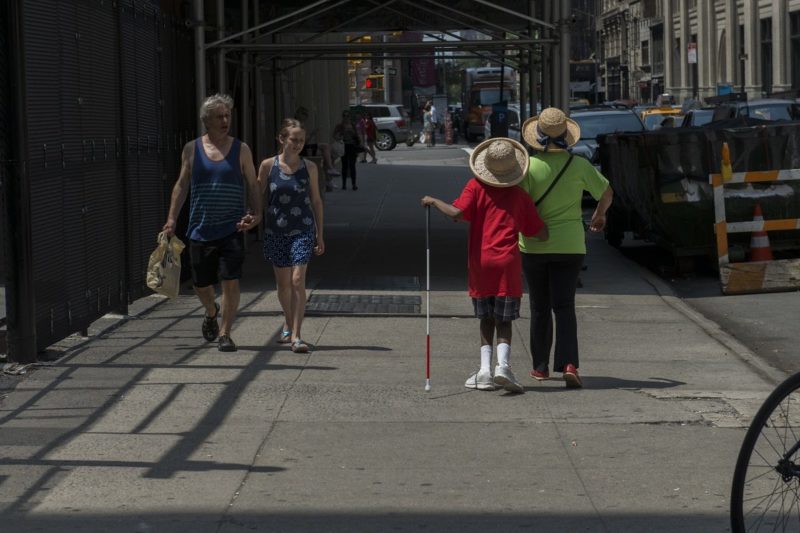Congress Makes Progress in Destroying the Americans With Disabilities Act
Last week, things went from bad to worse for us.

From literally putting their bodies on the line to save the Affordable Care Act to contending with a presidential administration that has demonstrated complete disdain for them, people with disabilities are facing unprecedented times. Last week, things went from bad to worse for us: Congress took significant steps in its efforts to destroy the landmark Americans With Disabilities Act (ADA).
As I have written previously for Rewire, Congress is considering the ADA Education and Reform Act of 2017 (HR 620), sponsored by Rep. Ted Poe (R-TX). If passed, this dangerous legislation would completely undermine the intent of the ADA and significantly harm the rights of people with disabilities.
Because of the ADA, businesses—such as restaurants, movie theaters, hospitals, hotels, and museums—must be fully accessible to people with disabilities. In addition, the ADA compels employers, as well as public and private entities including state and local governments, to provide reasonable accommodations to people with disabilities and prohibits discrimination based on disability.
Right now, if a disabled person faces an ADA violation, such as inaccessibility, at a business, they can file a complaint with the U.S. Department of Justice (DOJ) or file a lawsuit in court. Because there is no entity responsible for ensuring that businesses comply with the ADA, enforcement depends on people with disabilities to challenge violations.
Put briefly, if the ADA Education and Reform Act is passed, this will be a much more difficult process. Specifically, if HR 620 is passed, a person with a disability would be obligated to provide written notice to a business owner who has violated the ADA. The business owner would then have 60 days to even acknowledge that there is a problem and another 120 days to make progress toward correcting the violation. In other words, people with disabilities will have to wait 180 days to enforce their civil rights.
According to a letter to the House Judiciary Committee last week by 236 disability and civil rights organizations, “H.R. 620 was not written in consultation with representatives of the disability rights community and it would create barriers to the civil rights for persons with disabilities that do not exist in other civil rights laws.”
Despite this strong condemnation, however, the House Judiciary Committee held a markup hearing on Thursday where it voted HR 620 out of committee. The final vote was 15 to 9 along party lines; all of the amendments proposed by Democrats, including additional damages if a business fails to make progress after 120 days, were rejected. The ADA Education and Reform Act of 2017 will now move to a full House floor vote.
In response to this appalling vote, the National Disability Rights Network issued a statement on Friday: “More than 27 years after the passage of the ADA, the committee’s vote was not an attempt to reform or educate on the ADA, but a blatant attempt by Congress to say that it is ok to discriminate against people with disabilities by not making public accommodations accessible.”
Disability rights advocates were not the only ones to release scathing remarks in response to the vote. Ranking member Rep. Bobby Scott (D-VA) issued a press release expressing his disappointment that read, “H.R. 620 undermines the goals of the ADA to create a more inclusive society and provide equal participation for all members of the community by removing incentives to comply with ADA requirements, placing the compliance burden on individuals with disabilities.”
Likewise, Sen. Tammy Duckworth (D-IL), a disabled veteran and wheelchair user, wrote on Facebook, “It’s hard to believe this legislation advanced in the House this week. 27 years after the Americans With Disabilities Act became the law of the land, the notion that businesses in this country need more time to provide people with disabilities access to their services is ridiculous and offensive.” Referencing the pro-ADA protest in 1990, she continued, “This vote is a disgrace to those who literally crawled up the steps of the United States Capitol so many years ago to secure the protections enshrined in the ADA as well as to all those who value liberty and justice for all.”
Other members of Congress, including Sen. Maggie Hassan (D-NH), Sen. Patty Murray (D-WA), and Sen. Bob Casey (D-PA), issued similar statements condemning the House Judiciary Committee’s vote and committing to oppose passage of the bill in the Senate.
Of course, many business representatives, including the International Council of Shopping Centers, are celebrating the House Judiciary Committee’s vote.
Throughout the years, based on a false belief that the ADA is being abused via frivolous lawsuits, Congress has introduced a number of “notification bills”—which shift the burden of enforcement further onto people with disabilities—such as HR 620. But their passage has never seemed so likely as now. Individuals must join the efforts to stop this assault on the ADA by contacting their members of Congress, signing online petitions, and most importantly, joining the disability community as we continue to fight this dangerous legislation.
Considering that the U.S. president’s real-estate properties have violated the ADA on numerous occasions, the bill is certain to be signed into law if it crosses his desk. Today it is the ADA on the chopping block; tomorrow it may be another civil rights law.
